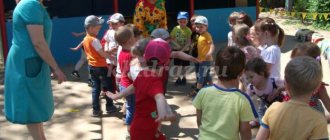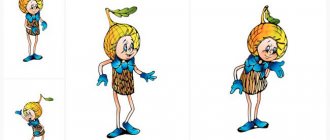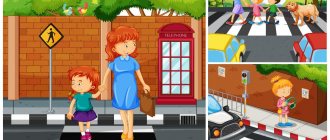Entertainment in a preschool educational institution for children 6-7 years old. “We are the future defenders of the Fatherland.”
Sports festival
"Defenders of the Fatherland"
in the group for 6-7 years.
Conducted by: Rodionova T.P.
Target:
to form in children patriotic qualities, pride and respect for the Russian army.
Tasks:
Educational:
Expand children's horizons through familiarization with military paraphernalia and military professions; activate vocabulary with new adjectives (strong-willed, resourceful, purposeful) Developmental:
Improve coordination of movements, develop dexterity and accuracy in children. Develop children's creativity and performance skills. Educating:
Encourage children, come to the aid of a friend, show support and sympathy.
Equipment (laptop, hoops, balls, skittles, bags, gymnastic sticks, vegetables, fruits). Progress of the event:
The hall is festively decorated.
Children, to the music - “Serve Russia”, enter the hall, performing a ceremonial formation, snake through the center, line up in a semicircle)
Child
Today is the day of our Army, there is no stronger army in the world. Hello defenders of the people! Russian Army... All
.
Hello! (Children read 3-4 poems prepared in advance.) Presenter
. Today we have gathered to celebrate Defender of the Fatherland Day. Probably, there are defenders in every home, in every family - these are grandfathers, older brothers, uncles, and of course your beloved dads!
I would like to wish them health, success in all their endeavors and pride in their children! Our preschool children give everyone present a song: “Brave Soldiers” - “to the right, sing a song!” children walk towards the chairs
,
at the end of the song they sit down. 1 child.
Happy birthday, army!
- says the country. Glorious protector, always be strong! 2child
.
We love our army, it is a great force, fearless in battle, it defeated all its enemies. 3child
.
And we sing songs about her, about valiant campaigns. She preserves our peaceful home, peace and work of peoples. 4child
.
The native army is strong and invincible in battles. She stands indestructibly guarding the Motherland. Child.
Boys dream of growing up quickly, becoming adults, and going to work.
Leading:
And in order to serve with dignity, you need to prepare for this from childhood. After all, a little time will pass, and our boys will grow up and take the place of those who are now guarding our Motherland. And today we will spend this holiday as a war game. All boys and girls, without exception, will participate in it, especially since in our time women also stand guard over the Motherland. So, the military exercises begin!
We will split into two teams,
Our competitions will be judged by a strict but fair jury,
Leading:
Let the jury follow the entire course of the training without a mistake, Whoever turns out to be more friendly will win today!
Teams, greet each other! Host
: So, we begin! First competition –
relay race “The most accurate shooter”.
Shells are flying, the battle is roaring, and it’s not so easy to hit the target! And only the one who really wants it will bring a point to the Team!
Leading
.
We continue our competitions, the next relay race is “Obstacle Course”.
(Climb under the arc, crawl along the bench, run around the stumps).
Leading
.
"Boat sailing" Each team member takes turns sitting in the basin and, pushing off with his arms and legs, “swims” to the “buoy” and then returns back.
Leading:
A fighter needs not only fast legs and a clear head, but also strength!
Let's have a strongman competition.
(Tug of war)
Leading:
Now for a little rest! I suggest you remember what military professions you know!
(Riddles about military professions) The last riddle: They never sleep, At their native border, Our sea, our land, They guard our sky. (border guards)
Leading
: To learn even better about the everyday life of border guards, Let's take a closer look at their service..
Game “Border Guards and Violators”
One team stands in a circle, holding hands.
The border is open for the team: Raise your hands, the second team marches to the music in and out of the circle. On the command “Watch”, lower your hands, those remaining in the circle are considered detained and are sent to the commandant’s office, that is, to the chairs. The soldier must be able to move carefully, but at the same time very quickly
in the trench, our guys will now show us how they can do it.
Relay: “Quickly into the trench.”
As the saying goes:
“War is war, but lunch is on schedule.”
Relay race: “Field kitchen”.
One team cooks borscht, and the other compote.
Well, the hostilities are coming to an end and our soldiers are ready to return home.
Relay race: “Fast armored train.”
The whole team needs to run like a train between the pins and return to their place.
The roles of locomotives will be performed by dads. Leading
: Well done! The children turned out to be worthy of praise and congratulations. It remains to wish that you always remain as cheerful and friendly! And now a declaration of love to our dads!
CHILDREN READ POEMS FOR DADS ON VIDEO.
“OUR ARMY” STEPANOV V., BORDER GUARD ZHAROV A.
Leading:
Well, now, it’s time to sum up the results of our military exercises.
And the floor is given to our jury. Summing up the game
, we are grateful to you guys for science, for the game,
Being resilient and agile doesn’t hurt anyone! “By order of February 23, in commemoration of the successful completion of military exercises, all personnel are awarded well-deserved awards.
Gifts are given to the teams for the group.
Taking photos near the central wall
Cognitive and creative project in the senior group “February 23 – Defender of the Fatherland Day”
Baraeva Lyubov
Cognitive and creative project in the senior group “February 23 – Defender of the Fatherland Day”
Project passport.
Type of project: educational - creative.
Implementation period : short-term (13.02-22.02).
Project participants: group teacher, senior preschool children, music director, parents of students.
Relevance of the project:
Due to recent changes, the loss of traditional Russian patriotic consciousness in our society has become increasingly noticeable. In this regard, the urgency of solving the most pressing problems of instilling patriotism in working with preschool children is obvious. Historically, love for the Motherland and patriotism have always been a national character trait in the Russian state. An equally important condition for the moral and patriotic education of children is a close relationship on this issue with their parents.
Interaction with parents promotes respect for traditions and preservation of family ties. Currently, this work is relevant and especially difficult, requiring great tact and patience, since in young families the issues of instilling patriotism and citizenship are not considered important and often only cause bewilderment.
Problem: lack of interest in the Russian army.
Justification of the problem: insufficient level of knowledge about the Russian army, the formation of gender; lack of desire to become a defender of the fatherland in the future.
Objective of the project:
— formation of a sense of patriotism in children of senior preschool age;
- involving parents in participating in the life of the kindergarten.
Project objectives:
— expand children’s knowledge about the Russian army, clarify their ideas about the branches of the military;
- develop children's cognitive activity and creative abilities;
— continue to instill in children patriotic feelings for the Motherland and pride in our history;
- develop and enrich children’s speech;
— work with parents, involving them in the patriotic upbringing of children in the family.
Expected Result:
— increasing children’s knowledge about the Russian army.
- children showing interest in the army and respect for the defenders of the Fatherland.
- children's desire to improve physical qualities and improve health.
- the desire of children to reflect their knowledge, impressions, thoughts and feelings in games, in singing songs, in reading poetry.
-increasing parents’ interest in developing a sense of patriotism in children.
Project implementation stages.
Stage 1. Preparatory.
- Project development.
— Inform project participants of the importance of this problem.
— Select methodological, popular science and fiction literature, illustrated material on this topic.
— Thinking through creative tasks for children and parents.
— Select materials, toys, attributes for play activities.
— Preparations for the holiday dedicated to Defender of the Fatherland Day.
Stage 2. Basic. Project implementation (by educational area).
— Social and communicative development:
Role-playing games: “We are sailors”, “Military nurses”, “Border security”, “On a warship”, “Sea semaphore” (see O. A. Skorolupova, part 1 p. 112).
Game - situation: “Army order” (see Appendix No. 1).
Construction game “Warship” (see O. A. Skorolupova, part 1, p. 112).
Didactic games:
“What does an artilleryman need”, “Who will I serve in the army?”, “Who protects our borders”, “Make a map”, “Military professions”, “Name the army by description”, “Guess the military profession”, “Flies, swims” , walks” (see Appendix No. 2).
NNOD (see educational field, artistic and aesthetic development).
— Cognitive development:
NNOD: (FCCM) on the topic “Russian Army” (see O. V. Dybina p. 38 topic 12).
NNOD: (FCCM) on the topic “Our Army” (see summary in Appendix No. 3).
Conversations about various types of troops, about the work of military personnel.
A conversation about the holiday “Defender of the Fatherland Day”, when and how it appeared; “Representatives of military professions”, “There is such a profession - to defend the Motherland” (see Appendix No. 4)
NNOD (see educational field, artistic and aesthetic development).
— Speech development:
Reading poems: I. Grosheva “February 23”, E. Blaginina “Thank you to the valiant soldiers”, “The Overcoat”.
Memorizing poems:
L. Nekrasova “Our dear army”, S. Marshak “Border Guards”, Agadzhanova “Defender of the Fatherland Day”, O. Vysotskaya “Glory to the Russian Army”.
Reading stories:
L. Kassil “Your Defenders”, Y. Ilyinsky “On Earth, in Heaven and at Sea”, V. Tyurin “We Ride, Swim, Fly”, A. Mityaev “Why is the Army Dear”, I. Gurin “Military Holiday”, "February 23".
Reading excerpts from epics about heroes.
Sayings, proverbs, riddles on the theme “February 23” (see Appendix No. 5).
Examination and conversation based on the painting by V. M. Vasnetsov “Bogatyrs”.
Examination of: reproductions, paintings, illustrations, photographs, albums on military topics (analysis and compilation of stories based on them).
Learning songs.
Finger gymnastics: “Our Army”, “Fingers – these are all fighters”, “Well done fighters” (see Appendix No. 6).
Speech outdoor game: “The Steadfast Soldier”, “Like Soldiers on Parade” (see Appendix No. 7).
— Artistic and aesthetic development:
NNOD: Drawing on the theme “Soldier on duty” (see T. S. Komarova p. 83 exercise 66).
Drawing on the theme “Border Guard with a Dog” (see T. S. Komarova, p. 85, exercise 70).
Drawing on the theme “Dad’s portrait” (see I. A. Lykova, p. 136, class 61).
Application on the theme “Sailor with signal flags” (see T. S. Komarova, p. 82, exercise 65).
Application on the theme “Tie for Dad” (see I. A. Lykova, p. 138, lesson 62).
Modeling on the theme “Tank” (see summary in Appendix No. 8).
Learning songs about the army: “The fighters are coming”, “Brave soldiers”, “We are heroes”, “We are still preschool children”; learning the dance “Step back - step forward.”
Listening to the song “Good Soldiers” (music by A. Filippenko, lyrics by T. Volgina).
Examination and conversation based on the painting by V. M. Vasnetsov “Bogatyrs”.
Examination of: reproductions, paintings, illustrations, photographs, albums on military topics (analysis and compilation of stories based on them).
Design of the exhibition “Military Equipment of the Russian Federation”.
Musical and sports festival of brave warriors “Brave Soldiers”.
- Physical development:
Outdoor games: “Border Guards and Violators”, “Sentries and Scouts”, “Signal Flags”, “Three Tankmen”, “Submarine”, “Secret Report” (see Appendix No. 9).
The game is an air relay race “Crossing” (see O. A. Skorolupova, part 1, p. 113).
Motor exercise “Comrade Commander” (see Appendix No. 10).
Speech outdoor game: “The Steadfast Soldier”, “Like Soldiers on Parade” (see Appendix No. 7).
Physical education, “We will defend the world”, “Border guard”, “Let there always be peace”, “We are military”, “Soldiers”, “Planes” (see Appendix No. 11).
Musical and sports festival of brave warriors “Brave Soldiers” (according to the plan of the music director).
— Working with parents:
Design of stand information, congratulations on the holiday.
Exhibition of decorative and applied arts “Military Equipment of the Russian Federation” (joint work of children with parents).
Photo exhibition “Guardian of Peace”.
Consultation for parents: 1) “Being a father is an honor.”
2) “The role of the father in raising a preschool child” (see appendix).
Stage 3. Final.
Final event: musical and sports “Good Soldiers” (according to the plan of the music director)
— preparation of an analytical report in the format of a multimedia presentation;
— broadcast of work experience for teachers as part of the pedagogical council.
Results of the project:
At the end of the project, children began to use military themes more often for games, spoke respectfully of the defenders of the fatherland, and proudly shared with their peers and teachers the knowledge they received from their parents about serving in the army. They began to play board, printed and didactic games with great interest. The level of cognitive and creative skills and communication abilities have increased. Parents have become active and interested participants in the educational process, and parents' interest in developing a sense of patriotism in their children has increased.
Bibliography:
1. Dybina O. V. Familiarization with the subject and social environment. Senior group. – M.: Mosaic – Synthesis, 2014.- 80 p.
2. Komarova T. S. Classes in visual arts in the senior group of kindergarten. Lesson notes. - M.: Mosaika-Sintez, 2009.-128p.
3. Lykova I. A. Visual activities in kindergarten: planning, lesson notes, methodological recommendations. Senior group. – M.: “Karapuz – Didactics”, 2009. – 208 pp., reprint.
4. Skorolupova O. A. Thematic planning of the educational process in preschool educational institutions. Technology for implementing the Federal State Educational Standard for preschool education. Senior preschool age. Educational and methodological manual for preschool teachers. Part 1 - M.: Publishing house, 2015.
technological map of the lesson
Educator:That's right, defenders of the Fatherland are warriors, that is, soldiers who defend our Motherland from enemies. Homeland is the place where we live. The Russian people have composed many proverbs and sayings about their Motherland:
- There is no land more beautiful than our Motherland!
-A person has one mother, one Motherland!
Guys, what do you think, one soldier can defend the fatherland?
Educator:
It’s absolutely true, it’s not in vain that it’s been said: “Alone, not a warrior in the field.” And when there are a lot of soldiers, it’s an army. Every nation, every country has its own army. Russia also has an army, and it has more than once defended its people from invaders.
The teacher suggests looking at pictures of military equipment.
Educator:
What's in the pictures?
Educator:
And in one word it is called “Military equipment”.
Getting to know the different branches of the military (viewing the presentation)
Who do you see here?
That's right, these are different types of troops of our army. And they are needed in order to defend their homeland at sea, on land, and in the air. Let's take a closer look at them:
1. Border guards are soldiers who guard the border. They are the first to meet enemy troops on the border. Border guards, like all military personnel, are protectors
our homeland. The border detachments have a guide with a dog. The dog helps the border guards and follows the trail.
2. Navy. The sea spaces of our Motherland are protected by warships. Sailors serve there. Ship commanders are captains who are responsible for the entire ship.
3. Air Force. How many of you know who the paratroopers are? These are troops intended for landing from the air, from an airplane. Soldiers of these troops must not be afraid of heights, can jump with a parachute, and must act quickly in difficult situations.
4. Ground forces. Infantrymen, artillerymen, missilemen, and tank crews serve in the ground forces. And also in the military forces there are signalmen, miners, and military builders.
Didactic game:
"Who Serves Where"
- Let's imagine that we are in the army. You already know that there are different types of troops in the army. Who serves on the border? Who serves on the tank? Who serves on the border? Who flies a helicopter? Who serves in the missile forces? Who serves on submarines? Etc.
Educator:
Well done guys, what do you have to be like to defend our homeland?
Educator:
That's right, strong, brave, courageous. Russian warriors have always been distinguished by dexterity, courage, resourcefulness and endurance. This is well said in proverbs:
- A brave fighter in battle is great.
“Where there is courage, there is victory.”
- To live - to serve the Motherland.
- If the army is strong, the country is invincible.
Physical education moment
"Aircraft".
The planes began to hum (rotation in front of the chest with arms bent at the elbows)
The planes flew (arms to the sides)
They sat quietly in the clearing (sat down, hands to knees)
And they flew again. (arms to the sides with rhythmic bends to the sides).
Educator:
Let's make airplanes out of paper and add the necessary details to them.
Educator:
Well done, you did a good job.
Now there is no war, no one is attacking us, why do we need an army in peacetime? Right. The army must always be ready to repel enemy attacks.
What do soldiers in the army do in peacetime?
That's right, the soldiers are training. Officers teach and train soldiers. To defeat the enemy, soldiers and officers must be brave, strong, resilient, and also dexterous and accurate. And to become like this, of course, you need to train.
Soldiers work out in the gym, lift weights, do pull-ups on the horizontal bar, learn to shoot in order to be accurate during battle. They run along a log, climb over a high wall with windows, jump over a deep hole, and walk through fire.
They train to be resilient during combat and overcome various obstacles with ease.




